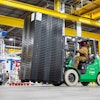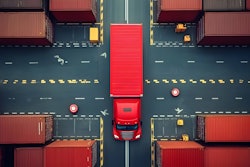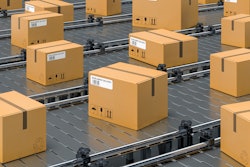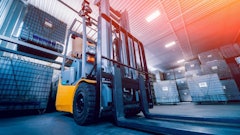
Today’s smart trailers are more than the humble haulers of yesterday. Equipped with advanced connectivity and data-rich capabilities, they’re transforming fleet management by improving efficiency, bolstering cargo protection and offering new levels of flexibility—all at a time when rising theft and insurance costs demand innovative solutions.
Central to the value of smart trailers is their ability to collect and share real-time data about their location, condition and activities such as loading and unloading. These insights help carriers, brokers, 3PLs and others make smarter decisions at every stage of the supply chain. In fact, this connectivity is reshaping how trailers are used, managed and even acquired.
While smart trailers currently represent only a small portion of the roughly 3 million trailers on U.S. roads, their potential to transform operations and improve profitability is driving adoption across the industry.
1. Reimagining Fleet Management
Smart trailer data becomes exponentially more valuable when shared across the supply chain. Through digital hubs, this data can be accessed by various stakeholders to inform operations and decision-making.
Carriers, dealers, fleet managers and even shippers can benefit from trailer maintenance and usage data.
Not only does proactive maintenance help reduce downtime, but trailer diagnostics can also help inform decision making. By preemptively looking at the trailer pool and considering whether a trailer should be utilized or not, this allows better coordination to service providers to maximize repairs while minimizing the number of inefficient trips. In turn, technicians can access diagnostic data and spare parts information to expedite repairs. Dealers can track deliveries and ensure trailers are serviced efficiently. And fleet managers can use historical data to optimize asset utilization or plan replacements.
This digital ecosystem also supports the growing trend of drop-and-hook operations, allowing companies to better track trailer locations, movements and availability. By providing real-time visibility, smart trailers enable more precise capacity management and reduce reliance on static or outdated inventory models.
Innovative service models like Wabash’s Trailers as a Service (TaaS) are further transforming fleet management. TaaS offers companies flexible access to trailer capacity without the burden of ownership, integrating smart trailer technology with maintenance, insurance and operational support. This allows carriers, brokers and 3PLs to scale their operations efficiently while focusing on their core business needs.
2. Transforming Support
Trailer breakdowns can be both disruptive and costly. With maintenance and repair costs rising year over year, smart trailers offer a proactive approach to reducing these expenses.
First, extensive insights into a trailer’s operating history and condition allow that trailer to be proactively or even preventatively maintained to prolong its operating life and reduce the risk of breakdowns and fines. Telematics systems monitor critical variables such as tire pressure, light functionality, wheel-end vibration and anti-lock braking system faults.
Smart trailer data also streamlines repair processes by allowing technicians to diagnose issues remotely before the trailer arrives for service. This minimizes downtime and improves the overall efficiency of fleet operations. With maintenance included in programs like TaaS, shippers, brokers and 3PLs don’t need to worry about surprise repair costs.
3. Protecting Cargo
With insurance premiums among the fastest-growing costs for carriers, protecting trailers and their cargo has never been more critical. Smart trailers provide advanced tools to protect cargo, reduce cargo claims and limit unexpected costs.
Door sensors, cargo sensors and/or cameras enable intervention through alerts or visibility especially in drop-and-hook operations where often the cargo is loaded and sealed prior to a carrier picking up a load. Having the visibility, via cameras, can show proper loading/securement and potentially pallet counts to simplify the potential claim process and the allocation to the party who may have contributed to the cargo loss. Door sensors, for example, can alert operators if a trailer is opened unexpectedly, helping deter theft and maintain temperature integrity for refrigerated goods. Cargo monitoring can also help ensure trailers are loaded safely, reducing the risk of damage or the introduction of hazardous materials.
Additionally, real-time tracking notifies fleet managers of unauthorized movements or delays, enabling quick responses to potential security breaches.
These features not only enhance security but also support compliance and risk mitigation efforts, offering measurable savings over time. Layering smart trailer technology on top of a program like TaaS provides an additional level of risk management support. Not only is trailer insurance included as part of a TaaS subscription, but trailer data can help subscribers with physical damage reimbursement and stolen asset management. In fact, smart trailer data has allowed some 3PLs to improve recovery rates for customers who have experienced trailer damage.
Driving Innovation
Smart trailers are not only improving fleet operations—they’re driving innovation throughout the industry. By capturing and analyzing data from trailers across different fleets, shippers and 3PLs, OEMs gain insights that inform the design of future trailer models.
This data-driven approach ensures trailers are optimized for efficiency, durability and cost-effectiveness at every stage of their lifecycle, from initial design to long-term operation and maintenance. As competition intensifies and costs rise, these innovations will be essential for transportation and logistics companies striving to maintain an edge.



















